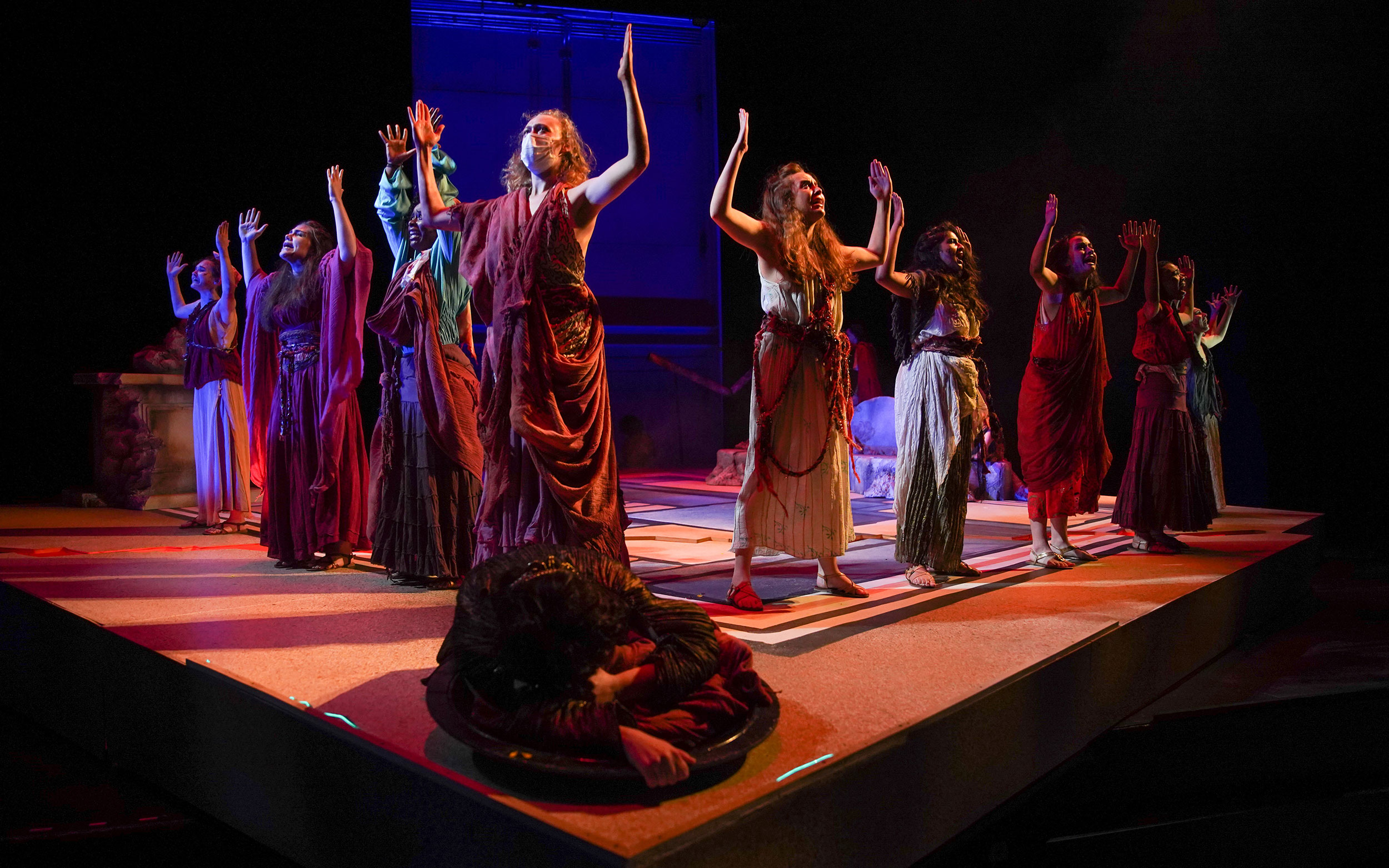Review by Liz Eichler
If you’re a fan of the classics, see CCM Acting’s production of Cincinnati Dionysia: Lysistrata and The Trojan Women. Both show strong women, etched in history. The name Cincinnati Dionysia was inspired by “City Dionysia” an ancient Athenian festival which focused on several days of theatrical and poetic performances in competition. Everyone from servant to aristocrat would be there.
Lysistrata is Aristophanes’ uproarious sex comedy, and The Trojan Women is Euripides’ tragic focus on the aftermath of war and loss of hope. Created between 411 and 415 BCE these contemporaries’ jobs were to provide catharsis for audiences—make ‘em laugh out loud together or make them feel “pity and terror” and cry together. It was viewed as an important communal washing of your soul as you see the tragic hero realize his or her flaws and hence as a city you will be reminded of history, not repeat it. Hmmm.
Aristophanes’ comedies were usually political commentary designed to make audiences laugh and think (The Birds,The Frogs, or The Wasps which transform current society into animals or insects). Euripides plays (such as Medea, Helen, Orestes) explore power, duty and identity, and provide the audience meaty and moving historical tales.
Both of these plays focus on how the Greeks were affected by the long conflict between Athens and Sparta. Lysistrata shows the protagonist’s anti-war activism during the war. The Trojan Women depicts the human costs of war after the fall of Troy. Ellen McLaughlin’s adaptations modernize the language but keep the intent. She makes these ancient texts relatable to a modern audience. However, they do skim over some of the original detail.
The production team also does a solid job presenting these themes to a modern audience. Director Brant Russell, Dramaturg/Director of Choral Movement Caitlin Hines, Musical Dramaturgy/Vocal Coach Megan Steigerwald-Ille guide these students into evoking emotion and character.
Scenic Designer Sami Tamulonis, Lighting Designer Alaina Pizzoferrato, Costume Designer Erin Donnelly, Sound Designer Christopher Berger (students all) and Composer Jay Mobley help communicate the time and space to the audience.
Lysistrata is fun and froth. This 45-minute version of the comedy explores what would happen when women collectively agree to stop all sexual relations until the Peloponnesian War is over. Lysistrata invites women from across the region to the “Peloponnesian Conference to Discuss the Most Important Issues of the Day.” She asserts that regular people do not want to go to war, it is not their war. What people want is a chance to love and work to the best of their abilities, so by “closing the gates” for a short time, they can have a better life collectively. So the Acropolis gates are closed and the ladies are reminded to “cross their legs and think of Greece.” These activists get the attention of Magistrate Jake Weinheimer and a number of military “Geezers” who present themselves, ready to fight, yet standing at attention (with clever phallic flower bouquets of varying size).
Ava Duvall is an excellently persuasive Lysystrata. Zoë Peterson does a great job setting the comedic tone, in bathrobe and towel as Calonice. Lydia Robison and Staylie Brunner are the chorus connecting with the audience.
The real gem of the evening is the tragic chorus, as a larger number of women participate in choral chanting and movement, more reminiscent of a classic Greek element, with tones of modern dance. The chorus is arresting as it echoes and clarifies the sentiments of both the people and the royal Trojan women. These women are prisoners, their husbands, children and families dead or captured. They are regal in their defeat, as they come to accept that the end of the war is not the end of their story, and that no matter how awful things are now for them–they will only get worse. It is the hope that kills you. The only one with hope is Cassandra (Lily Olsen), Queen Hecuba’s (Rachel Larson) daughter, who sees into the future. She must go to be the concubine of the conqueror, but knows that that is not the end of that story. Helen’s (Lydia Robinson) boldness rankles the devastated women. In this version they take their revenge on her.

Andromache (Madeleine Gaughan) has an emotional turn as she is told by Talthybius (Galen Arnett) her child must be destroyed, as none of Hector’ heirs can live. The men are inhumane and more horrible after the war as at the beginning. These themes are pounded out with the chorus, where the rhythm, movement, lighting, and fog are both soporific and mesmerizing.
Students’ production skills are highlighted during intermission, as the audience is invited to watch the transition from the bright and colorful Lysistrata set to war-torn destruction. A thunderous crack breaks the floor allowing the release of smoke and fog, adding to the feel of the smoldering and immediate Fall of Troy. Poseidon (Jake Weinheimer) rises from the orchestra pit, in an otherworldly costume and make-up; his staff immediately identifies the ruler of the deep sea. All costumes and props in the show are layered, textured and appropriate, echoing authentic grecian garb but merging it with modernity. As an added layer, a subtle soundscape plays throughout the show. At the end of intermission is an impassioned “lecture” about the ancient Greeks, featuring Madeleine Gaughan.
This production is interesting, educational, yet modern as it presents the problems we still face today–the awful effects of war on people–yet we still have hope that war can be avoided. Is that our flaw? Get your tickets HERE to see the two sides of war, comic and tragic, as well as an amazing take on the classical tragic Greek Chorus. Cincinnati Dionysia plays only through Sept. 29-Oct. 2, 2022.
Liz Eichler has a BA and MTA in Theatre, and an MBA in Marketing. She’s been both a Professional Costumer and Marketer, and has taught at multiple colleges and universities in multiple states for over 20 years. Liz is a past-president of LCT and has been involved for over 10 years.






